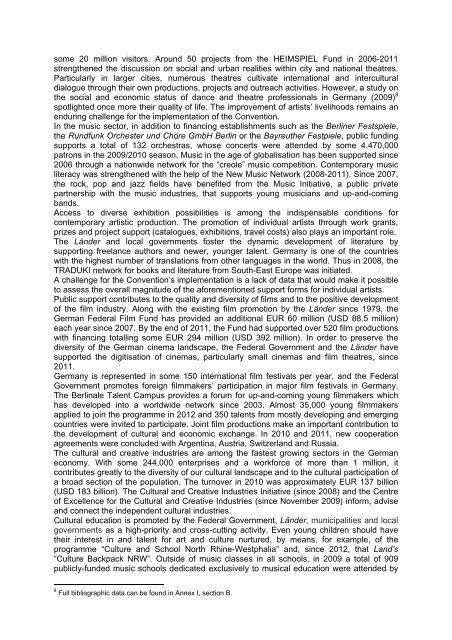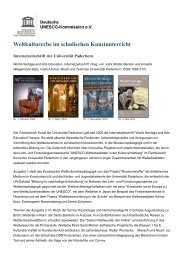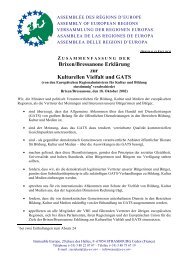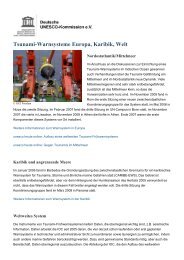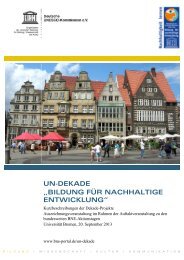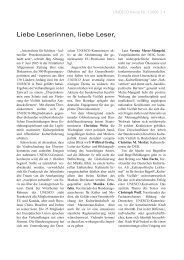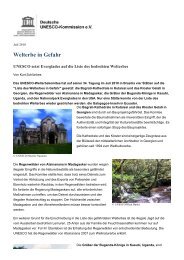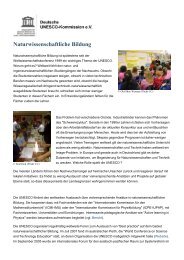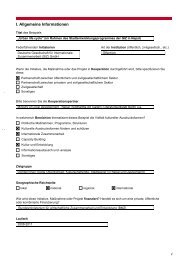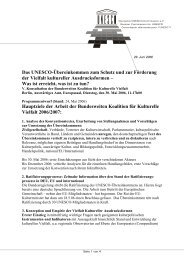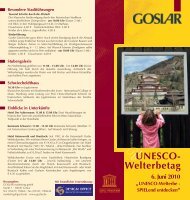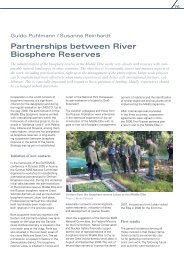Annex Form - Deutsche UNESCO-Kommission
Annex Form - Deutsche UNESCO-Kommission
Annex Form - Deutsche UNESCO-Kommission
Create successful ePaper yourself
Turn your PDF publications into a flip-book with our unique Google optimized e-Paper software.
some 20 million visitors. Around 50 projects from the HEIMSPIEL Fund in 2006-2011<br />
strengthened the discussion on social and urban realities within city and national theatres.<br />
Particularly in larger cities, numerous theatres cultivate international and intercultural<br />
dialogue through their own productions, projects and outreach activities. However, a study on<br />
the social and economic status of dance and theatre professionals in Germany (2009) 8<br />
spotlighted once more their quality of life. The improvement of artists’ livelihoods remains an<br />
enduring challenge for the implementation of the Convention.<br />
In the music sector, in addition to financing establishments such as the Berliner Festspiele,<br />
the Rundfunk Orchester und Chöre GmbH Berlin or the Bayreuther Festpiele, public funding<br />
supports a total of 132 orchestras, whose concerts were attended by some 4,470,000<br />
patrons in the 2009/2010 season. Music in the age of globalisation has been supported since<br />
2006 through a nationwide network for the “creole” music competition. Contemporary music<br />
literacy was strengthened with the help of the New Music Network (2008-2011). Since 2007,<br />
the rock, pop and jazz fields have benefited from the Music Initiative, a public private<br />
partnership with the music industries, that supports young musicians and up-and-coming<br />
bands.<br />
Access to diverse exhibition possibilities is among the indispensable conditions for<br />
contemporary artistic production. The promotion of individual artists through work grants,<br />
prizes and project support (catalogues, exhibitions, travel costs) also plays an important role.<br />
The Länder and local governments foster the dynamic development of literature by<br />
supporting freelance authors and newer, younger talent. Germany is one of the countries<br />
with the highest number of translations from other languages in the world. Thus in 2008, the<br />
TRADUKI network for books and literature from South-East Europe was initiated.<br />
A challenge for the Convention’s implementation is a lack of data that would make it possible<br />
to assess the overall magnitude of the aforementioned support forms for individual artists.<br />
Public support contributes to the quality and diversity of films and to the positive development<br />
of the film industry. Along with the existing film promotion by the Länder since 1979, the<br />
German Federal Film Fund has provided an additional EUR 60 million (USD 88.5 million)<br />
each year since 2007. By the end of 2011, the Fund had supported over 520 film productions<br />
with financing totalling some EUR 294 million (USD 392 million). In order to preserve the<br />
diversity of the German cinema landscape, the Federal Government and the Länder have<br />
supported the digitisation of cinemas, particularly small cinemas and film theatres, since<br />
2011.<br />
Germany is represented in some 150 international film festivals per year, and the Federal<br />
Government promotes foreign filmmakers’ participation in major film festivals in Germany.<br />
The Berlinale Talent Campus provides a forum for up-and-coming young filmmakers which<br />
has developed into a worldwide network since 2003. Almost 35,000 young filmmakers<br />
applied to join the programme in 2012 and 350 talents from mostly developing and emerging<br />
countries were invited to participate. Joint film productions make an important contribution to<br />
the development of cultural and economic exchange. In 2010 and 2011, new cooperation<br />
agreements were concluded with Argentina, Austria, Switzerland and Russia.<br />
The cultural and creative industries are among the fastest growing sectors in the German<br />
economy. With some 244,000 enterprises and a workforce of more than 1 million, it<br />
contributes greatly to the diversity of our cultural landscape and to the cultural participation of<br />
a broad section of the population. The turnover in 2010 was approximately EUR 137 billion<br />
(USD 183 billion). The Cultural and Creative Industries Initiative (since 2008) and the Centre<br />
of Excellence for the Cultural and Creative Industries (since November 2009) inform, advise<br />
and connect the independent cultural industries.<br />
Cultural education is promoted by the Federal Government, Länder, municipalities and local<br />
governments as a high-priority and cross-cutting activity. Even young children should have<br />
their interest in and talent for art and culture nurtured, by means, for example, of the<br />
programme “Culture and School North Rhine-Westphalia” and, since 2012, that Land’s<br />
“Culture Backpack NRW”. Outside of music classes in all schools, in 2009 a total of 909<br />
publicly-funded music schools dedicated exclusively to musical education were attended by<br />
8 Full bibliographic data can be found in <strong>Annex</strong> I, section B.


